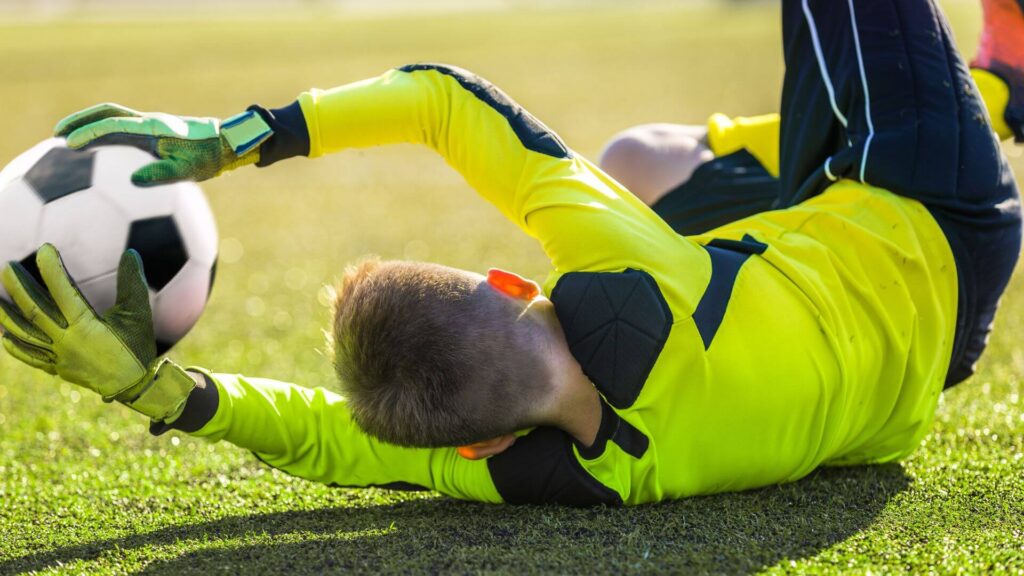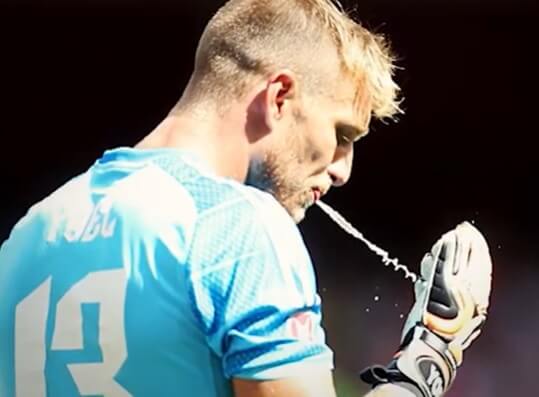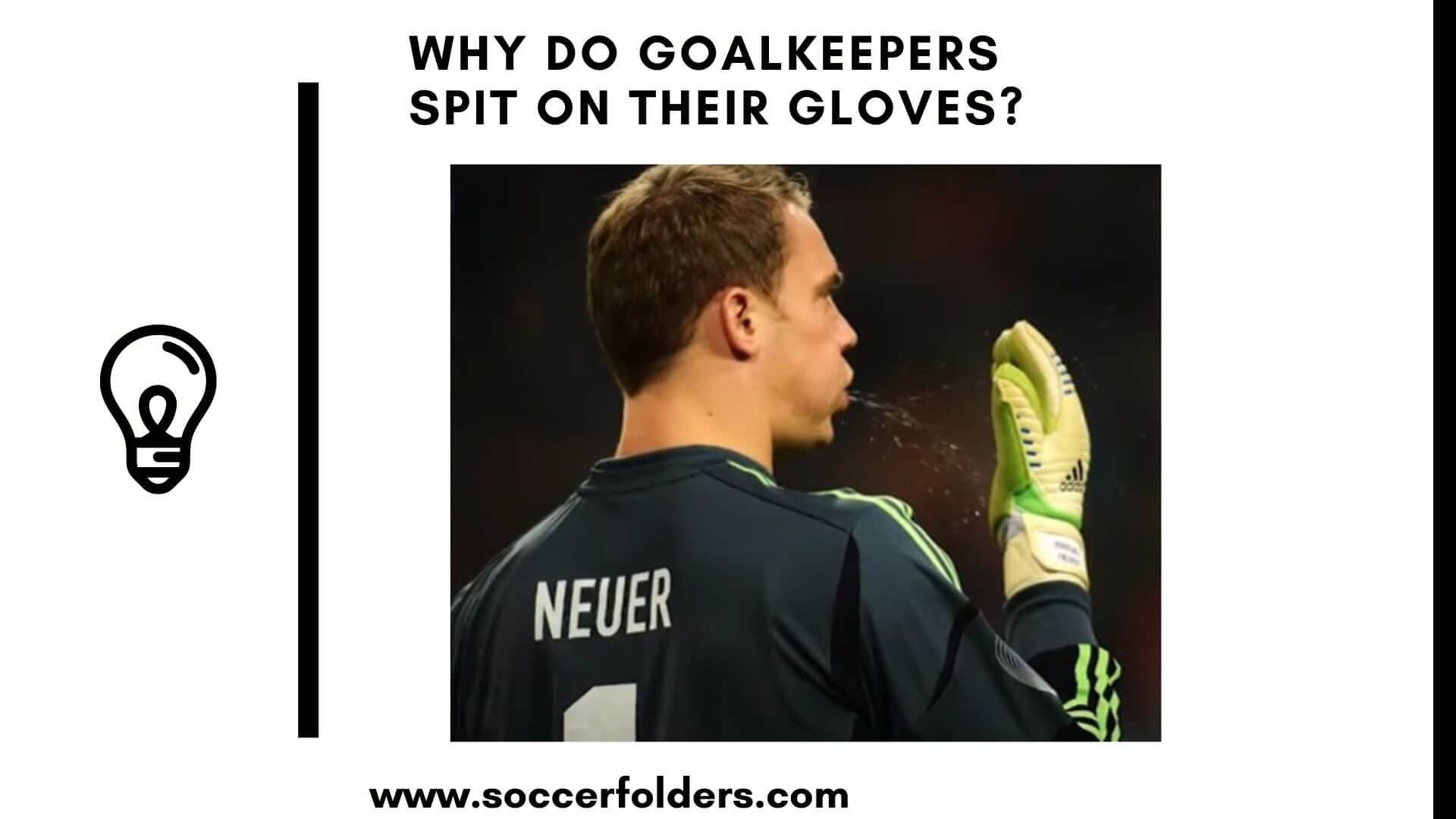Why do goalkeepers spit on their gloves?
First off, as a soccer enthusiast, you might have noticed goalkeepers spitting on their gloves before the start of the game or during the match.
It may seem like a disgusting and unsanitary habit, but it serves a crucial purpose for goalkeepers.
In this article, we will explore why goalkeepers spit on their gloves, the science behind it, and its benefits.
Let’s jump right in.
Why do Goalkeepers Spit on their Gloves?
Goalkeepers spit on their gloves to help increase the grip between the glove and the ball, making it easier for them to catch and hold onto the ball during gameplay. Spitting on their gloves is a technique that goalkeepers use to improve their performance and increase their chances of making successful saves.
Additionally, the saliva can help to moisten and soften the glove material, further enhancing the grip.
==>>You can also read: Why do soccer players spit out water?
Goalkeepers are the last line of defense in a soccer match, and their main objective is to prevent the ball from entering their team’s net.
One of the techniques they use to accomplish this task is maximizing their grip on the ball, especially during high-pressure situations such as a penalty kick or a one-on-one situation with the opposing team’s striker.
Spitting on their gloves is a method that goalkeepers use to increase the grip on their gloves. By spitting on the gloves, the saliva creates moisture, which helps the goalkeeper to have a better grip on the ball.
The saliva acts as a lubricant between the ball and the gloves, making it easier for the goalkeeper to catch the ball and hold onto it.
Moreover, the saliva on the gloves helps the goalkeeper to improve their control of the ball.
During a game, the ball can come at a high speed, and goalkeepers need to be agile and fast to catch it. The saliva on the gloves helps the goalkeeper to have a better grip on the ball, allowing them to control the ball better and quickly release it for a counter-attack.
The Science behind Goalkeepers Spitting on their Gloves
Now, you might be wondering about the science behind this seemingly peculiar habit. How does spitting on their gloves improve a goalkeeper’s performance? Well, the answer lies in the chemical composition of saliva.
Saliva is composed of enzymes, proteins, and glycoproteins that help in the breakdown of food and protect the mouth against bacteria. Enzymes such as amylase, lipase, and protease help to break down carbohydrates, fats, and proteins, respectively. Proteins such as mucin and lysozyme protect the mouth against bacteria and other pathogens.

When the goalkeeper spits on their gloves, they transfer some of the enzymes and proteins in their saliva onto the gloves. These enzymes and proteins create a thin layer of moisture that increases the grip on the gloves.
Additionally, the enzymes and proteins in the saliva help to soften the glove material, further enhancing the grip.
Benefits of Spitting on Gloves for Goalkeepers
Apart from improving the grip on the gloves, spitting on gloves provides other benefits for goalkeepers. These benefits include:
- Preventing blisters
Goalkeepers often experience blisters on their hands due to the constant contact with the ball. These blisters can be painful and affect their performance. Spitting on gloves helps to prevent blisters by providing a layer of moisture between the gloves and the hands. The saliva acts as a lubricant, reducing friction and preventing blisters.
- Maintaining the hygiene of gloves
Goalkeepers sweat a lot during a match, and their gloves can become dirty and unhygienic. Spitting on gloves helps to clean them by removing dirt and sweat. The enzymes and proteins in the saliva have antibacterial properties that kill the bacteria on the gloves, reducing the risk of infection.
- Boosting confidence
Soccer is a mental game, and confidence plays a vital role in a player’s performance. Spitting on gloves has a psychological effect on goalkeepers. It gives them a feeling of control and confidence over the ball, improving their performance and giving them an edge over their opponents.
==>>Also read: How to gain confidence in soccer?
Should you Spit on Goalkeeper Gloves?
While spitting on goalkeeper gloves is a common technique used to improve grip and performance, it is not recommended. The saliva on the gloves can be unhygienic and lead to bacterial infections. Instead, goalkeepers should consider using other methods to improve grip and performance, such as using goalkeeper-specific gloves and grip-enhancing sprays.
Ultimately, it is crucial to prioritize hygiene and safety on and off the field.
Does Spit Make Glove Stickier?
Yes, Spit can make goalkeeper gloves stickier because saliva contains enzymes and proteins that interact with the materials used to make the gloves. When goalkeepers spit on their gloves, the saliva creates moisture that enhances the grip and control over the ball.
Did you know that using Vaseline can also improve grip on your goalie gloves?
Well, check out this article on how to use Vaseline on soccer goalie gloves.
Why do Goalkeepers put Water on their Gloves?
Goalkeepers put water on their gloves to improve their grip on the ball during the game. The moisture from the water enhances the stickiness of the gloves, making it easier to catch and control the ball. Additionally, water helps to cool down the hands of the goalkeeper, which can become sweaty and uncomfortable during the game.
However, it is essential to note that using too much water can make the gloves heavy and reduce grip. Goalkeepers must strike a balance and use the right amount of water to improve their performance on the pitch.
By the way, here is what ZPro Sports recommends about goalkeepers spitting on their gloves:
Spitting for grip is a bad idea, leading to a lasting stench. Here’s what to do:
- Keep water handy for matches and training. Moistening gloves lightly maintain clean latex.
- After each play, use a damp towel for better grip.
Stick to these natural methods for longer glove life without costly sprays. Just water and a damp towel – it’s that easy. Your gloves, your folks, and your budget are all better off.
Final Word
In conclusion, spitting on gloves is a common practice among goalkeepers and serves a crucial purpose in improving their performance.
The saliva on the gloves creates moisture that enhances the grip and control over the ball. The enzymes and proteins in the saliva also have antibacterial properties that help to clean the gloves and reduce the risk of infection.
While spitting on gloves may seem like a gross habit, it is a necessary technique that goalkeepers use to improve their performance.
Apart from enhancing the grip, spitting on gloves also helps to prevent blisters, maintain hygiene, and boost confidence.
However, it is essential to note that the use of saliva on gloves has become a controversial topic due to the COVID-19 pandemic. The virus spreads through respiratory droplets, and spitting on gloves can increase the risk of transmission. As such, many soccer leagues have banned the use of saliva on gloves to prevent the spread of the virus.
Before leaving, you can also read my article on why goalkeepers wear gloves here.
If you need any specialized tips about anything related to soccer, you can reach out to Warren NZAMBI via contact@soccerolders.com.

